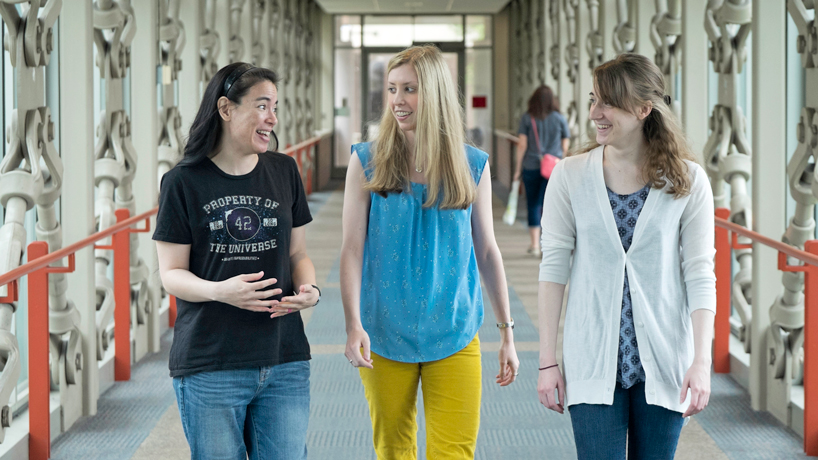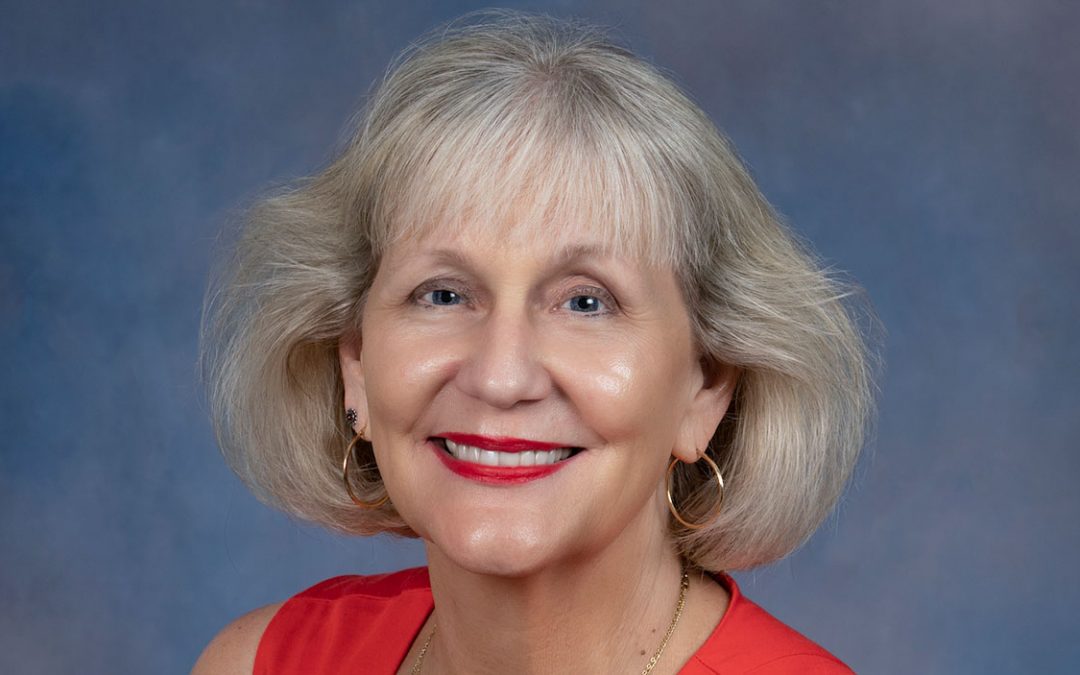
The Japanese National Honor Society recognized recent UMSL graduates (from left) Susanne Mackay, Kristin Kottemann and Anita Fike for excellence in the study of the Japanese language, a growing academic program at the university. (Photo by August Jennewein)
“Daijoubu? Daijoubu?”
The Japanese word for “OK” was the only one Susanne Mackay knew in March 2011, when a devastating earthquake and tsunami struck Japan, where her late mother was born and raised.
“We couldn’t communicate with my mother’s family at all – that’s the only word I knew, so it was hard,” recalls Mackay, a student at Southern Illinois University Edwardsville at the time. “I thought, ‘OK, I need to learn Japanese.'”
It wasn’t offered at SIUE, and upon learning that the University of Missouri–St. Louis offered a major in the challenging language, Mackay transferred to UMSL as an art major. She expected to simply fulfill her major’s language requirement and then go back to SIUE. But after one year, she wanted to keep going, so she stayed at UMSL and switched her entire course of study to Japanese.
These days, she writes letters back and forth with her Japanese aunt, who was overjoyed to hear she was learning the language. Mackay finished up her degree at UMSL this spring and is now exploring certification options for teaching English to speakers of other languages.
“I’d like teach immigrants here in St. Louis,” Mackay says. “My mom kind of got thrown into America with three kids, and my father was in the military. And then he got deployed back overseas, and she was just stuck without knowing much English. So I would love to help other people be able to communicate, get the basics down.”
In May, Mackay was inducted into the Japanese National Honor Society along with fellow Japanese language graduates Anita Fike and Kristin Kottemann. The three new UMSL alumnae share a love for anime, a high regard for their talented “senseis” (faculty members) at UMSL and a drive to keep on learning.
“I like the idea of learning more and more,” says Kottemann, who transferred to UMSL from the University of Missouri–Columbia three years ago after a semester studying in Japan. “With Japanese being such a difficult language, it can be stressful. But as you put in that effort, you do get something out of it, and I kind of like that continuous struggle of trying to figure stuff out.”
Even though Kottemann started at UMSL a year later than Mackay, Fike and several other Japanese majors who recently earned their degrees, she quickly felt welcome.
“Michael sensei [Amy Michael], the main teacher, has always been very friendly and understanding and helpful for all the students,” Kottemann says. “And when I came here, I kind of immediately felt like I was part of a group, in my class.”
The Japanese Studies program got a boost last fall when the Japan Foundation awarded UMSL a grant enabling a new faculty hire, Assistant Teaching Professor Keiko Ueda.
“She’s from Japan,” Kottemann says. “Having her perspective, especially in our fourth year, was really good, I think.”
Fike, who has been accepted into a graduate program at Washington University in St. Louis for the fall, was impressed by the flexibility and student-centered nature of the program and faculty members at UMSL.
“I came in, and they didn’t know what level to put me in,” explains Fike, who began studying Japanese in junior high. “They’ve always been finding ways for me to keep learning … I really feel like the professors care about getting the students what they need.”
Mackay has appreciated the teaching style, with professors who “get really animated and draw it out of you.”
“If you’re stuck on something, they will go out of their way to help you and figure out a way to work things out in a way that makes sense to you,” she says. “And they’re always saying, ‘Stop by the office, stop by the office!'”
A highlight for Kottemann was a two-week Japanese study tour last summer with a handful of classmates and UMSL faculty members Beth Eckelkamp and Amy Michael.
“We got to have both teachers travel with us, and all of their knowledge,” Kottemann says. “It was really great having people there who can schedule things and take you around and tell you about stuff, because it makes the experience a lot more rich.”
Despite their newly minted diplomas, all three women still consider themselves very much students of the Japanese language.
“It’s something that you have to keep doing, and there’s always more to learn,” Mackay says. “You’re always running into things, like when you’re watching anime or hearing people talking at the Japanese Festival, that you’ve never noticed before. And just being able to spot those things is kind of fun.”
So is the complexity of the language itself, adds Fike, who was a student in the Pierre Laclede Honors College.
“I really like how conceptually ideas fit from Japanese culture to Japanese language,” she says. “Everything is very nuanced, I think particularly for Japanese. There’s a lot that doesn’t translate. They have all of these different ways of being honorable and humble and respecting someone, and we don’t have that.”
That nuance makes for clumsiness at times, she adds, but that’s OK.
“People make mistakes when they’re speaking [in their native language] all the time. When you’re speaking in a foreign language, you’re more critical of yourself, thinking, ‘Why can’t I say this right?’ But then you’ll mess something up in English about five minutes later.”















